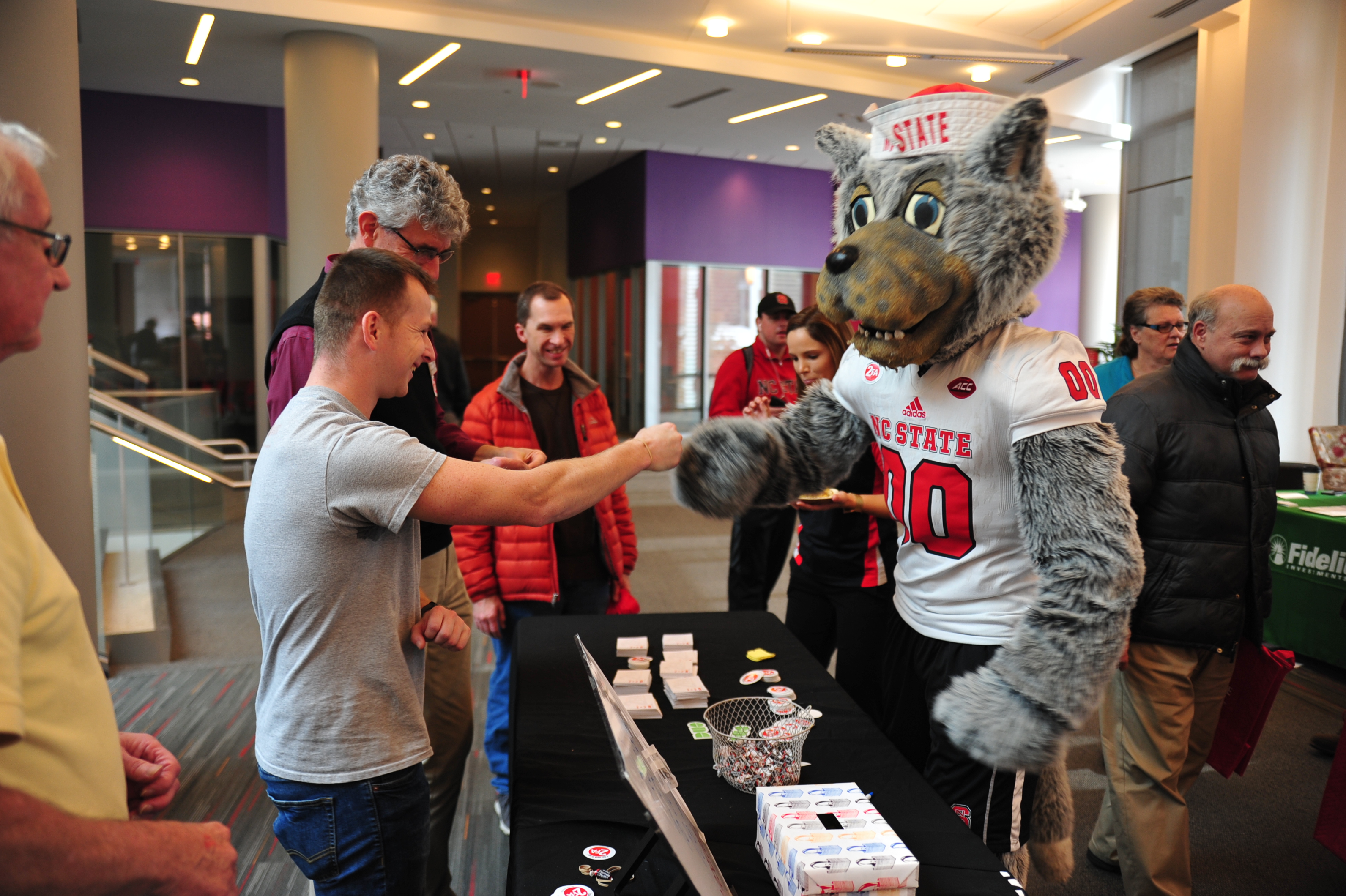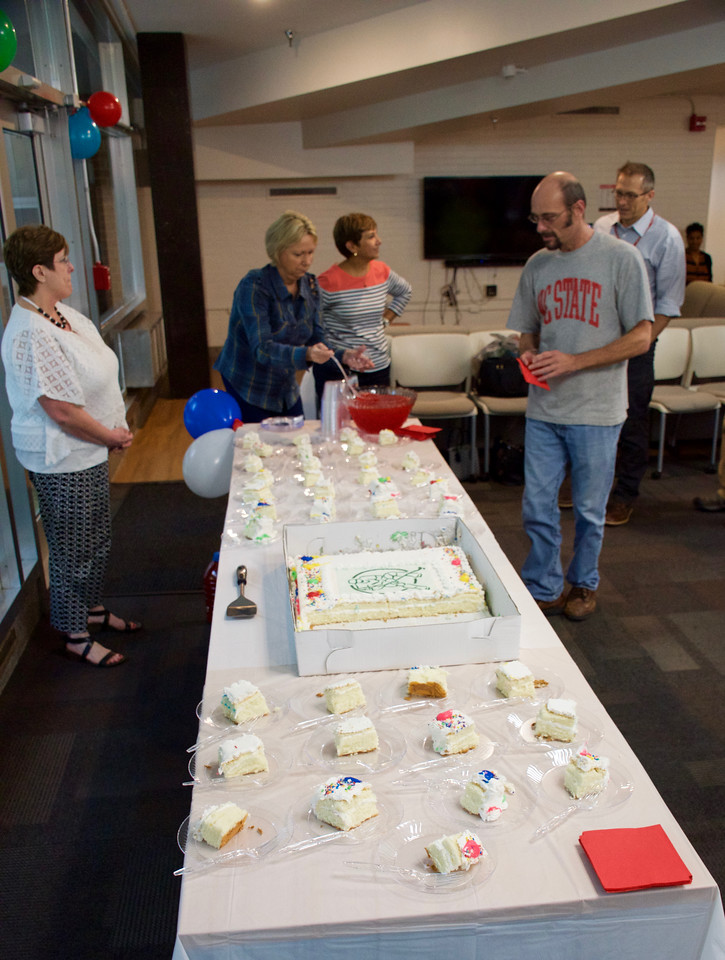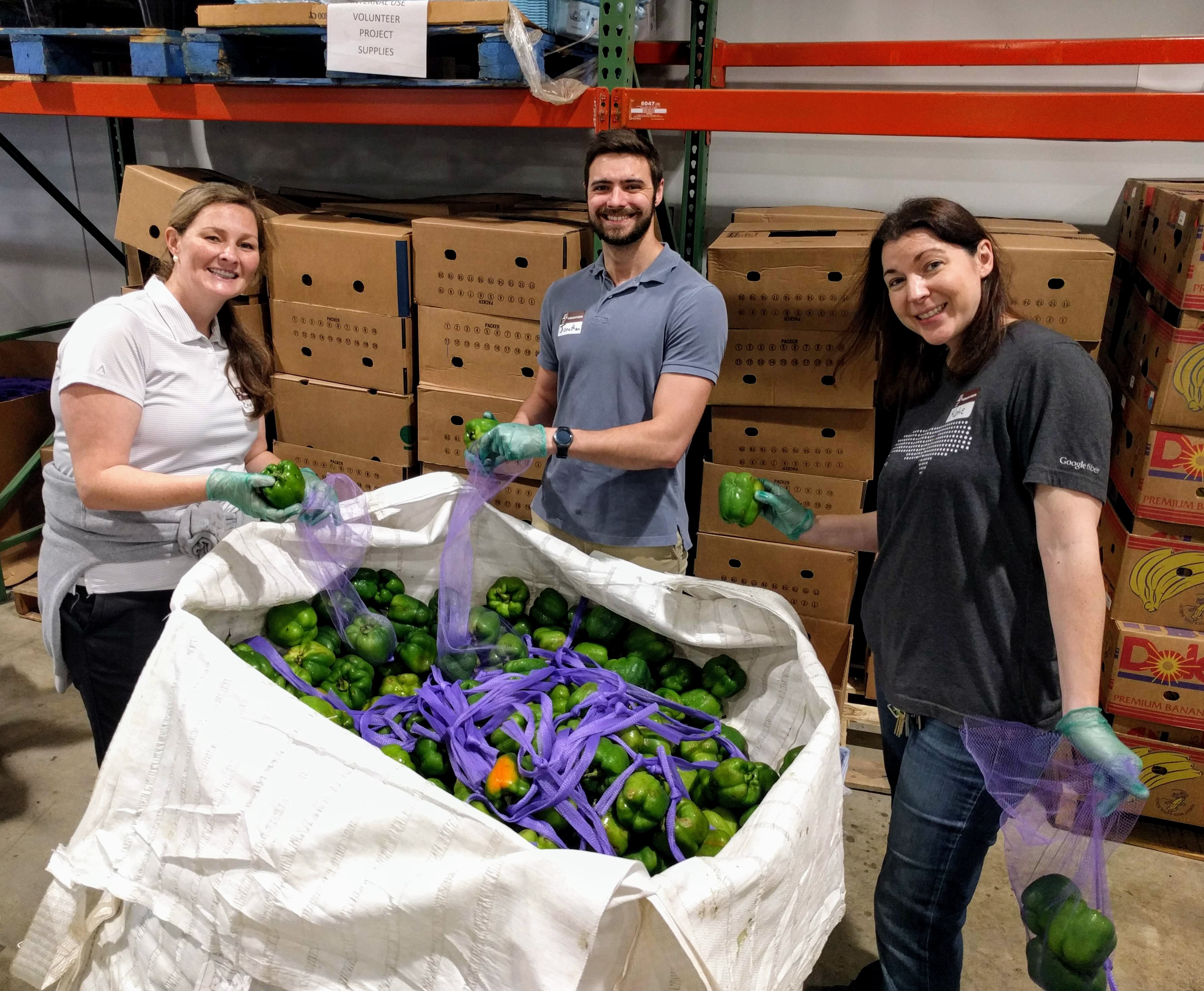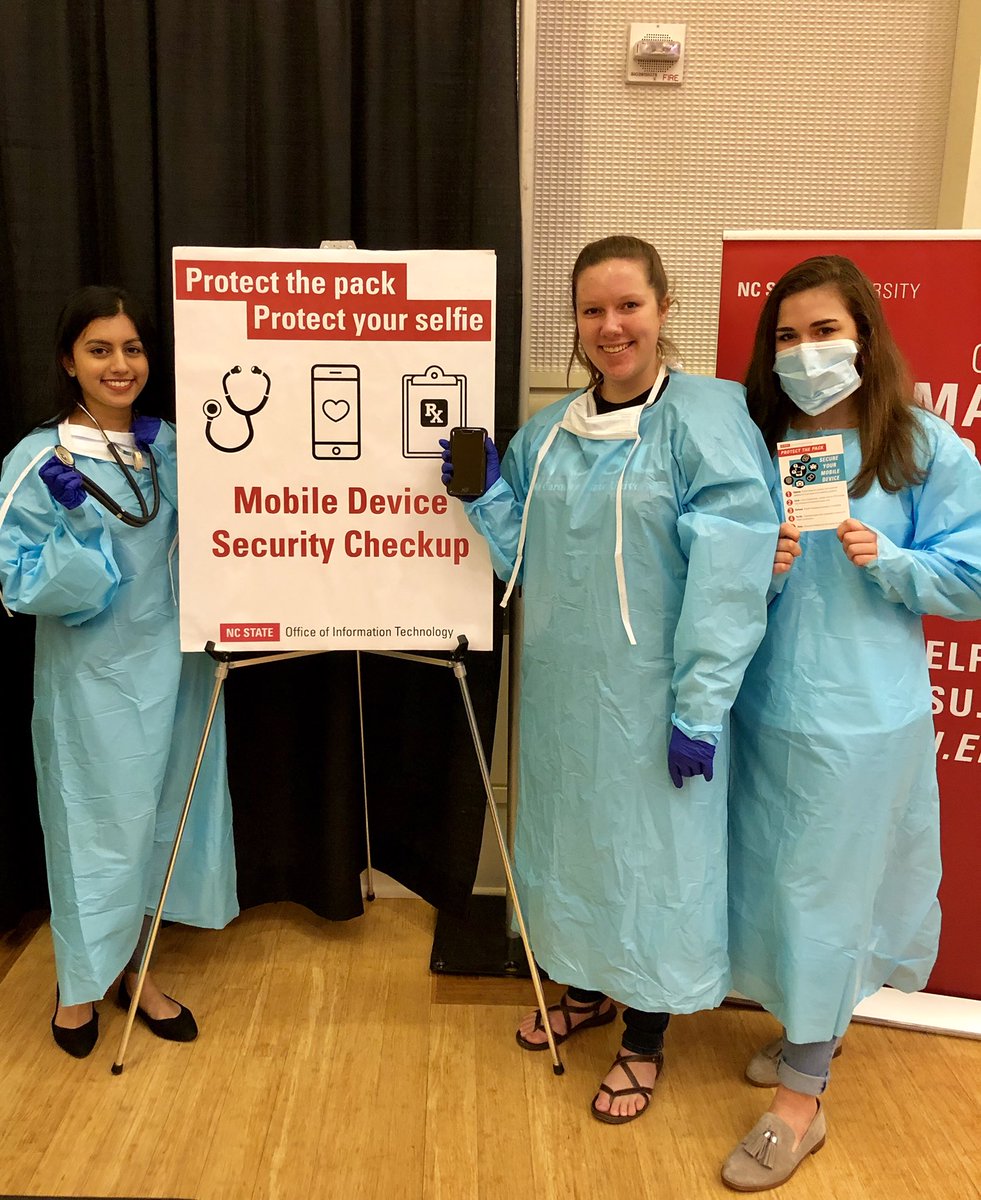
We Think and Do IT!
Office of Information Technology
2017-18 Annual Report
While much has changed with technology in higher education, IT remains the foundation that helps NC State achieve its success and build its future. We are proud to provide innovative solutions, systems and services, many of which are represented in this commemorative Annual Report. We thrive to support the Pack and all that you do!
Dr. Marc I. Hoit
Vice Chancellor for Information Technology
and Chief Information Officer
Inside the 2017-18 OIT Annual Report
- Timeline: 10 Years of OIT
- About OIT
- OIT by the Numbers
- 2017-18 Highlights
- Making SURE!
- Portal to student success
- Scoring a hat trick
- The right step
- Strategic Goals
- Staff Achievement
Timeline: 10 Years of OIT
2007 – 2008
The Office of Information Technology (OIT) was created Nov. 1, 2007, bringing together NC State’s two central IT organizations — Resource Management and Information Systems (RMIS) and the Information Technology Division (ITD).
2008 – 2009
Dr. Marc I. Hoit was hired as the university’s first Vice Chancellor for Information Technology and Chief Information Officer on Sept. 1, 2008. Within a few months of his hire, Dr. Hoit initiated a three-phase strategic planning process to improve the use of information technology as a driver for change.
The OIT Walk-in Center, or WIC, opened in fall 2008 to provide student-focused IT help, ResNet, student phone and cable TV, and student-owned computer repair and support services.
The implementation of the WolfWise calendaring and email environment for NC State was completed in the summer of 2009.
The PeopleSoft Student Information System was launched as OIT worked to migrate applications from the 20-year-old mainframe platform.
OIT launched its new website to facilitate communication with campus and to bring its services information into a new Drupal content management system.
2009 – 2010
In fall 2009, NC State and UNC Chapel Hill agreed to jointly develop and operate PeopleSoft Human Resources (HR) and Financials Administrative Software systems, leveraging the strengths of both institutions to provide robust services at reduced costs.
The Parent Portal was launched to provide easy access to parent services such as online bill payment.
2010 – 2011
Embracing the spirit of “Collaboration, Communication and Education,” OIT completed the migration of all student email accounts to Google Apps @ NC State. This move produced a “win-win” for the university, providing significant cost savings and access to a suite of popular collaboration tools for students.
A new campus voice mail system was rolled out to campus, consolidating the antiquated voice mail systems of Main Campus and the College of Veterinary Medicine into one feature-rich system.
Google’s Postini Message Discovery was implemented to help university employees comply with state laws regarding the retention of public records, particularly email.
The NC State Help Desk added a Call Center group, staffed primarily with students, to handle calls and escalate unresolved calls directly to the Support Center for additional support.
2011 – 2012
OIT planned to split the combined Student and the HR System into two individual systems, in conjunction with the upgrades to PeopleSoft version 9 in October 2012.
In collaboration with other IT campus units, OIT developed a new IT Governance Structure, which is phase II of the strategic planning process to improve the use of information technology as a driver for change.
OIT introduced Web Hosting Services, providing campus units with a cost-effective option to host their Web presence using content management services such as WordPress and Drupal managed by cPanel.
OIT provided the cloud-computing infrastructure for the North Carolina Bio-Preparedness Collaborative project (NCB-Prepared), which detects and analyzes biological threats to public health and safety.
On, Nov. 30, 2011 or “Google Day,” OIT marked the culmination of a multi-year effort to migrate all university students, faculty and staff to a single email and calendaring system, Google Apps @ NC State.
OIT and the McKimmon Center for Extension and Continuing Education implemented Destiny One, the university’s first enterprise system for the management of non-credit course and certificate offerings. This implementation included the university’s first SAS data mart.
OIT helped to develop processes to scan invoices and purchasing card (Pcard) statements into the Singularity system using WolfCopy multi-function copiers.
OIT replaced the Kronos System with the Kaba time clock system, which provided web-enabled time-punching.
OIT and Distance Education and Learning Technology Applications (DELTA) partnered to deliver expanded classroom capture solutions using Mediasite, a rich-media capture system.
The Casper Suite was deployed as a campus enterprise service to more effectively manage the university’s growing numbers of Apple OS X and iOS devices.
OIT upgraded the campus network backbone, including two data centers, to support up to 40 Gb/s of network traffic.
NC State collaborated on the implementation of the Centennial Outdoor Wireless Mesh Network Testbed for Research and Education (CentMesh), one of the country’s first large-scale, outdoor, experimental wireless networks using open source software.
OIT re-energized its efforts to collaborate with campus units to launch a comprehensive identity management program.
2012 – 2013
OIT began moving the campus wireless infrastructure to the latest Wi-Fi technology – 802.11n, providing greater capacity for the 105,000 unique devices that utilize the campus network.
OIT joined the Poole College of Management, the departments of Computer Science and Electrical and Computer Engineering, and the Office of Research to implement a new Power Linux cluster with 10 compute nodes and 770 TB of storage to support investigations into new techniques to perform big data analysis.
OIT offered more advanced unified communications services, including Single Number Reach, Extension Mobility and Voicemail to Email.
With the Office of Contracts and Grants, the University Research Committee and the Research Support Council, OIT implemented a new Principal Investigator (PI) Portal, offering an intuitive way for NC State research faculty to view HR and financial information related to their projects in the Research Administration Data & Reports (RADAR) system.
OIT made significant progress with the Data Sensitivity Framework, a set of guidelines to define the basis to establish what university data is sensitive and how to protect that data.
OIT completed its Managed Desktop Environment transition. At the end of the migration, over 2,700 desktops had been migrated to Windows 7 and from a Novell-based environment to a Windows Active-Directory environment. Over 700 home and share directories were migrated as part of the transition from the Novell-based file services environment to OIT’s Windows-based file service allowing the decommissioning of the Novell environment.
A major transition from OIT’s legacy student accounted printing service, PaperCut was rolled out to campus for the fall 2012 semester. FollowMe Printing was rolled out for the spring 2013 semester; it allowed students to print from a lab computer or their personal computer and release the print job at printers at various campus locations.
OIT partnered to get the James B. Hunt Jr. Library online with more than 1,000 network connections and multiple technologies.
2013 – 2014
NC State adopted its first strategic IT plan — Partners in Innovation: A Strategic Plan for IT at NC State, 2014-2020 — which provided the framework for the campus IT community to best support the university’s mission. This effort resulted in eight IT Guiding Principles and six IT Strategic Goals to help guide every IT decision-maker on campus. This completed Dr. Hoit’s three-phase strategic planning process to improve the use of information technology as a driver for change.
OIT received a $499,890 National Science Foundation grant to develop a new network autobahn to deliver high-volume data transfers to NC State researchers.
OIT launched a pilot of eduroam (education roaming), an encrypted wireless service for the international research and education community. The service allowed university students, employees and guests to have secure Internet connectivity both on the NC State campus and while visiting participating institutions.
OIT implemented a new OnBoarding Portal to guide new employees through the various activities to successfully assimilate into the campus community.
2014 – 2015
NC State, in partnership with UNC Charlotte and the Renaissance Computing Institute, received a $2.1 million grant from the UNC Research Opportunities Initiative to build a cloud-based computing infrastructure to support research projects important for North Carolina’s economy.
OIT implemented HigherOne as an enterprise PCI-compliant eStorefront application.
OIT implemented NextGen, a graduate appointment process, within the HR System to streamline the decentralized selection, contract generation, employment offer extension, and acceptance process.
2015 – 2016
OIT partnered with PowerAmerica to develop a secure IT environment, based on NIST 800-53 security requirements, that now serves as a business case to protect university research data.
OIT, in cooperation with campus IT partners, continued development of a five-year Cybersecurity Strategic Plan to combat security threats and bolster protection of physical assets, including facilities that house sensitive data and systems. Efforts also include the development of a Cybersecurity Roadmap to implement the plan’s goals.
OIT and campus units implemented REPORTER, a cloud-based service to track on-campus and off-campus non-credit courses.
OIT and Enrollment Management and Registration and Records implemented NC State’s new Pack Planner, a “one-stop shop” for course management. Pack Planner offers students a user friendly design and a new Suggested Plan, a template of eight semesters of approved courses based on degree requirements, to make it easier to identify courses.
OIT replaced its aging Remedy call tracking with ServiceNow, providing a diverse set of tools for call tracking and other facets of IT service management.
2016 – 2017
NC State replaced its aging account management infrastructure with a new integrated Identity Management system that provided all campus users with self-service User Identification and Authentication security questions, self-service password change and reset and password expiration notifications.
OIT deployed a new version of the MyPack Portal, Financial System and Employee Self-Service that offered significant navigation improvements, including a modern look and more mobile and user friendly interfaces.
OIT, alongside campus IT partners, developed a Cyber Security Liaison Program to keep the university’s digital assets secure by continuously identifying and addressing weaknesses in its cyber defenses.
2017-2018
Read on for more highlights
Aerial view of campus. Photo by Roger Winstead.
About OIT
NC State’s Office of Information Technology (OIT) provides campus-wide computing, information and communication technology services in support of the university’s academic and administrative goals.
Our Mission
To provide nimble, effective, efficient, and collaborative IT services, solutions and strategies in a timely and helpful manner that assist the university, state and nation in achieving their strategic goals.
Our Vision
Be the IT organization that people seek out as a partner for providing visionary strategies, creative solutions, objective information, and effective and efficient services in order to help them achieve their mission and goals.
Our Units
OIT has a staff of 291 employees in seven units:
- Business Services
- Budget management, accounting, procurement, human resources, and asset management
- Communication Technologies
- Campus data network, infrastructure design and installation, data center management, file backup, firewalls, unified communications, telephone, campus operators, CATV, and video services
- Enterprise Application Services
- Advancement, Business Intelligence, Finance, Human Resources, Identity Management, MyPack Portal, Database Configuration and Management, Non-Credit, and Student Information Systems
- Outreach, Communications and Consulting
- Training, communications, IT accessibility, website design and development, mobile and application development, G Suite @ NC State, cable TV (PackTV) content, and media production
- Shared Services
- Virtual Computing Lab, High Performance Computing, research IT, middleware and application integration, storage, file services, directory services, and deployment of infrastructure and core services
- Security and Compliance
- IT operational security and support, IT security standards and procedures, risk and compliance, portfolio project management and organizational resilience, and software licensing management
- Technology Support Services
- Help Desk, Walk-in Center, ResNet, ClassTech, OIT Managed Desktop, ServiceNow, hosted services, student computing services, and desktop and end-user support
Our Budget
OIT’s budget for fiscal year 2017-18 was $59 million, with personnel accounting for 58 percent and operating cost accounting for 42 percent. The budget included funding that was carried over from last year and one-time and continuing funding from the university.
OIT received over $4 million in one-time funds for enterprise storage, cybersecurity, data center upfit, access layer refresh, building rewire, network infrastructure, and server infrastructure refresh.
OIT by the Numbers
Research

High Performance Computing (HPC) Cluster supported:
- 489 faculty and students
- 134 research projects
- 18 courses
- 10 Gbps network connections to research-intensive buildings
Virtual Computing Lab supported:
- 10,006 unique users
- 124,569 reservations
- 2.18 million reservation hours
Student Success
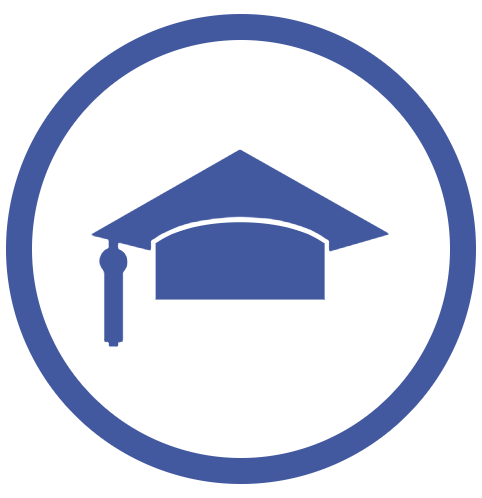
- 155,115 unique devices connected to the wireless network.
- 161,000 optical mark exams scanned.
- 400 student-produced sports programs created for PackTV.
- 190 million files shared for collaboration on Google Drive in the last year. 142 million of these were shared privately among individual account holders inside or outside our domain.
- 2.05 million pages printed in the WolfPrint accounted printing service.
- 10,177 new copies of the OnCampus mobile app downloaded.
- 2,900 WordPress blog sites.
- 56,148 applications for admission processed resulting in 11,530 enrollments; 836,340 credit hours and academic progress managed for 38,018 students in over 21,363 classes; and 8,654 degrees awarded.
- 1,700 teaching licenses processed.
Collaboration

- ~58% of the 660 IT-related positions on campus were external to OIT.
- $9.4 million of the software licensing on campus is managed by OIT’s Software Licensing Management team; $1.1 million of which is managed partnerships with colleges and departments.
- 255 spaces supported by ClassTech. These spaces include 161 of the 226 110 classrooms. All 110 classrooms have technology.
- 18,000 Windows devices managed via the jointly-maintained Active Directory service.
- 56 units at nine UNC schools used the federated Jamf Pro Apple device management suite that is co-managed by NC State OIT staff.
- 87,492 Google Hangout video conferences held in 2017-18. Of those, 611 were held on Jan. 17, the most on a single day.
- 60+ departments, center or other unit sites are using the Hosted WordPress environment.
Organizational Effectiveness

- 100% network backbone uptime.
- 145 new clickwrap agreements reviewed.
- 42,798 wired outlets and 88,082 network ports.
- 7,163 wireless access points.
- 14,863 phone lines.
- 44,412 campus operator calls received.
- 40,000+ software downloads.
- 220 training sessions conducted, covering 78 unique topics and serving 2,264 enrollees (excludes custom classes).
- 2,400 phone calls per month received by the Help Desk Call Center, resolving more than 45,000 incidents over the past year. Over 50 percent of help desk tickets are related to account access problems. The Help Desk averaged about 110 Duo bypass incidents each month this year, and the OIT Walk-in Center handled 375 2FA-related incidents and 471 password help incidents.
- 194,000+ ServiceNow incidents logged from over 200 assignment groups throughout campus.
- 1.28 million unique pageviews on the OIT multisite network sites.
- 54 Web Design Services contracts with 36 unique departments.
- 38,239 active shortened links through the Go Links service.
- 3,075 software licensing support tickets resolved.
- 117 eStores managed involving 40,327 transactions and over $9.3 million in revenue.
- 75,000 registrations and 3,900 class sections managed in REPORTER involving $2.7 million in course payments and fees and more than 3,500 external customers.
- 9,000 reservations across 30 labs in four facilities managed via the new Lab Management System, resulting in over $2.6 million in revenue.
- 993,000+ documents (2,142,000+ pages) managed within the OnBase Document Management System.
- 116,000 vendor payments (including employee reimbursements), 44,000 student refunds and $312 million in purchases of goods/services processed for total payments of $654 million.
- $34 million processed in non-student billing managed.
- $900 million in payroll costs managed across 7,500 funding sources for 26,000 employees resulting in 1.4 million payments; 5.8 million time punches for approximately 20,000 employees processed.
- 24,000 hire/rehire actions and 50,000 benefit enrollments processed; 26,000 W-2s generated.
- 4,200+ enterprise application migrations managed.
- 120 databases managed.
Security

- 1,304 campus users assisted after their accounts were compromised.
- 35,006 individuals enrolled in Google 2-Step Verification and ~30,000 enrolled in Duo, as of May 1, 2018.
- 998 applications requested for InCommon Certificates, which validate the security of websites.
- 12,237 ServiceNow tickets requested Security and Compliance assistance in support of security services including scanning, Tripwire and Splunk.
- 191 third-party vendor assessment reviews associated with the IT Purchase Compliance process with average time of 17.78 days to close tickets. About 28.27 percent required security reviews and 5.02 percent required accessibility reviews.
- 16,472 clients had Spirion installed for sensitive-data discovery.
- 2,700+ assets out of 9,700 total assets in Nexpose are scanned for vulnerabilities on a regular basis.
- 200,000+ identities managed.
- 5,700+ system access requests processed in Security Access Request (SAR).
2017-18 Highlights
Making SURE!
NC State University is a major participant in research discovery and innovation, much of it supported by federal and state funding sources that it relies on to expand and to grow its mission.
Within the last fiscal year, NC State encountered a critical challenge, accompanied by significantly limiting budgetary, logistical and technological constraints: Ensure that all research projects with the Department of Defense (DoD) meet the International Traffic in Arms Regulations (ITAR) and the National Institute of Standards and Technology (NIST) 800-171 security requirements by Dec. 31, 2017 or risk losing precious federal and state funding.
A SURE Solution
The solution, the Secure University Research Environment or SURE, transpired as an urgent need for the university to develop and launch a secure, compliant infrastructure to support sensitive research contracts or grants.
Given the urgency to achieve high compliance by Dec. 31 and a plan to achieve full compliance by June 30, 2018, it was imperative that OIT collaborate with each impacted research group and their respective IT support staff.
OIT worked with the Office of Research and Innovation (ORI) and principal investigators to identify all projects requiring DoD security controls and to analyze their unique workflows and determine how to secure each individual project.
Constrained by limited time and resources to meet over 100 technical security controls within a few months, OIT quickly developed a short-term solution, Amazon Web Services GovCloud, to address ITAR requirements, which are significantly more restrictive than those of the NIST 800-171 controls.
The effort required successful collaboration with stakeholders and subject matter experts across campus. OIT and ORI achieved high compliance, with only a limited need to develop a System Security Plan to continue working towards full compliance by June 30, 2018.

Portal to Student Success

Photo by Becky Kirkland
Students as well as employees are learning to navigate the newly designed MyPack Portal to connect to human resources, financial and student activities that they use most frequently.
In October, OIT and campus partners implemented a new tile-based navigation that offered a modern look and a mobile, user friendly interface for the online Portal, the Human Resources (HR) System and the Student Information System (SIS). The Employee Self Service and Financial System also underwent a similar upgrade in March of last year.
The newly designed Portal is a shift from a menu-driven navigation to a tile-based navigation, which is increasingly familiar to many smartphone and tablet users. Portal users are now easily able to create new homepages and customize existing ones based on their personal preferences.
The change was a major transformation for the Student system, and student feedback played a significant role in the success of the upgrade. Over a six-month period, the SIS development team designed, built and tested the interface. The team used student feedback to organize the contents of each tile in an intuitive, yet efficient manner to ease the student learning curve.
The team also solicited feedback from campus advisors who often assist students with Portal-related questions. Campus advisors participated in “demo days” to view and test SIS functions, including planning and enrollment, academic records and tasks and holds.
The SIS team is continuing to make improvements to the Student Information System, including changes to the online withdrawal process, appeal process, transfer credit process, database architecture, and the admission system.
Scoring a Hat Trick

Last summer, OIT Communication Technologies (ComTech) scored a hat trick, or three feats, improving an aging campus network infrastructure in student housing with state-of-the-art data cabling, network switches and wireless access points.
As a result, students enjoy faster wired and wireless internet services on their mobile devices. And these upgrades place NC State at the forefront in internet services provided in residence halls.
Past Plays
Throughout NC State’s campus, there are three generations of cabling. Back in the mid 1990s, NC State laid the foundation for its first network infrastructure in its residence halls, installing Category 5 cabling with a maximum speed of 100 megabits per second. In the early 2000s, ComTech began installing the new Category 6 cabling until 2011 when the new Category 6A standard emerged, capable of 10 gigabits per second and much faster than typical internet speeds today.
A year later, ComTech began a major project to upgrade its infrastructure, replacing the remaining Category 5 cabling with the new Category 6A.
Each year while most students were on summer break, ComTech staff worked to complete the massive project, replacing roughly 2 million feet or 370 miles with Category 6A cabling. It also installed 247 new network switches, components that manage devices plugged into a network, upgrading those from 100 megabits per second to 1 gigabit per second.
The new cable and network switches provide students with faster internet services when they use the wired or wireless network.
Wireless

To improve wireless connectivity, ComTech installed 4,367 access points, or devices that provide wireless access to a wired Ethernet network, in each room of the 20 residence halls and in Wolf Ridge and Wolf Village apartments. The new system means students can freely move around their residence halls and apartments and remain on the network.
All residence halls now have either Category 6 or Category 6A cabling, and ComTech is working to replace Category 5 cabling in 15 academic buildings by 2020.
Excluding work done before 2012, the project totaled $6.7 million and came under the projected budget by 1.4 percent.
Present Play
To strengthen wireless connectivity for interactive teaching, ComTech has installed one access point per 40 seats in 160 of the university’s 110 classrooms. The largest auditorium on campus, 3400 Nelson Hall, required 12 access points.
The goal is to upgrade the remaining 77 classrooms by the end of December 2018.
Future Play
ComTech will continue to install more access points, upgrade switches and evaluate new technologies to make the right plays that will enable the campus community to easily connect to the resources it needs.
The right step
When the new fiscal year began on July 1, 2017, about half of NC State employees were enrolled in Google 2-Step and Duo Security, the university’s mandatory two-factor authentication (2FA) solutions. And the Oct. 31 deadline was drawing near.
The mandate was the right step to protect approximately 23,000 employees — faculty, staff, student employees, no-pay employees, and retirees — against ever increasing cyber threats. Google 2-Step and Duo are simple two-step login processes that enable employees to log in securely to their G Suite accounts and many university web applications. Both also prevent up to 98 percent of all phishing attacks.
While the 2FA clock ticked, it was important to communicate to employees the urgency to comply or risk loss of access to university services, which could further impact their studies or employment.
The 2FA Core Team, in partnership with various campus entities, prepared to launch a training and communication assault. The team:
- Provided a countdown on its website and offered 131 training sessions, including 2FA training days as well as individual, on-demand and custom training with campus departments.
- Offered train-the-trainer sessions and a resource kit with digital and printed marketing material for campus departments to use with their 2FA enrollment efforts.
- Provided 2FA employee enrollment reports to campus departments.
- Sent over 200,000 2FA email reminders to employees who had not enrolled. As the deadline neared, the 2FA message changed and the monthly reminders increased to biweekly and then weekly. The week prior to the deadline, employees received daily reminders.
- Developed a process and communications plan to enroll new hires after the Oct. 31 deadline. OIT also trained the Onboarding Center staff to assist new employees with enrollment within their first few days of employment. This has been a successful partnership and new employees are enrolling correctly.
When Oct. 31 arrived, 84 percent of all employees had enrolled in Google 2-Step and 80 percent in Duo. Employees who had not enrolled in 2FA were locked out of their G Suite accounts and were unable to access many university services without contacting the NC State Help Desk for enrollment assistance. Of those employees, the 2FA Core Team determined that many, such as retirees, did not use their accounts on a regular basis or their accounts were inactive.
The 2FA Core team is now exploring another large-scale 2FA endeavor — the pilot and enrollment plan for NC State’s 34,000-student population.
University Strategic Goals
- Enhance the Success of Our Students Through Educational Innovation
- Enhance Scholarship and Research by Investing in Faculty and Infrastructure
- Enhance Interdisciplinary Scholarship to Address the Grand Challenges of Society
- Enhance Organizational Excellence by Creating a Culture of Constant Improvement
- Enhance Local and Global Engagement Through Focused Strategic Partnerships
OIT supports the goals of “The Pathway to the Future: NC State’s 2011-2020 Strategic Plan” through the following services.

GOAL 1: ENHANCE THE SUCCESS OF OUR STUDENTS THROUGH EDUCATIONAL INNOVATION
- Purchased, in conjunction with the NC State Libraries, a campus site license for Lynda Online Training for students, faculty and staff.
- Completed multi-year project to provide ubiquitous Wi-Fi throughout all residence halls.
- Partnered with Distance Education and Learning Technology Applications (DELTA) to create a strategic plan to implement pervasive wireless in all general purpose classrooms in support of the increasing use of learning response systems.
- Continue to grow the Project Management Lite Internship program, averaging 29 interns each semester. The PML program provides students an opportunity to work on real projects with experienced professionals and helps them to build their strengths and increase their talents and knowledge. This year’s interns assisted with the implementation of two-factor authentication for faculty, staff and affiliates. They also promoted the initiative via the IT Club, Cyber Security Awareness Month and Campus Connections.
- Implemented a major Student Information System upgrade to version 9.2, which included moving to Fluid, a more modern, mobile-friendly user interface for all student facing self-service and the Student System homepage.
- Enhanced functionality within the Student Information System to support new Satisfactory Academic Progress initiatives.
- Worked with the Graduate School to implement Slate, a customer relationship management platform for graduate admissions.
- Conducted training and provided information for new students and their parents at 27 orientation sessions.
- Worked with the Department of Computer Science on several projects supporting graduate students with real-world data and business use-case scenarios that provided new and unique way to analyze our security data and to handle events.
- Continued to promote the teaching college/internship model by partnering with university interns and graduate students on OIT Security and Compliance projects.
- Developed new student organization website service with the Division of Academic and Student Affairs (DASA).
- Partnered with DELTA to plan end of life for Turning Point clickers as TopHat polling system is rolled out. Instead of paying for clickers, students can use their personal devices with TopHat.
- Shared 190 million files for collaboration in Google Drive in the last year. About 142 million of these were shared privately among individual account holders inside or outside the university’s domain.
GOAL 2: ENHANCE SCHOLARSHIP AND RESEARCH BY INVESTING IN FACULTY AND INFRASTRUCTURE
- Selected and began implementation of a new Enterprise Research Administration (ERA) system that will replace the 15-year-old custom-developed system. Staffing for the team to support the system is underway.
- Completed with Research and Innovation the development of a Secure University Research Environment (SURE) to support sensitive research contracts or grants that require NIST 800-171 compliance and the Department of Defense FAR Supplement (DFARS) clause to meet a December 2017 deadline. Achieved a high level of compliance, with only a limited need to develop Plans of Action and Mitigation documentation to achieve 100 percent compliance. Created an Auditor Guide as a framework to document how the university complies with each security control.
- Completed a security assessment of the PowerAmerica program in partnership with Internal Audit to document and identify security and compliance gaps.
- Created a network standard to enable 10Gbs network connectivity to endpoints as needed.
- Implemented a custom-developed Lab Management System and onboarded four centers, including the Molecular Education, Technology and Research Innovation Center (METRIC), totalling 30 labs to manage scientific equipment reservations. Billed and managed over $1 million in revenue this fiscal year.
- Continuing to work toward NIST 800-171 compliance for the High Performance Computing cluster used by researchers.
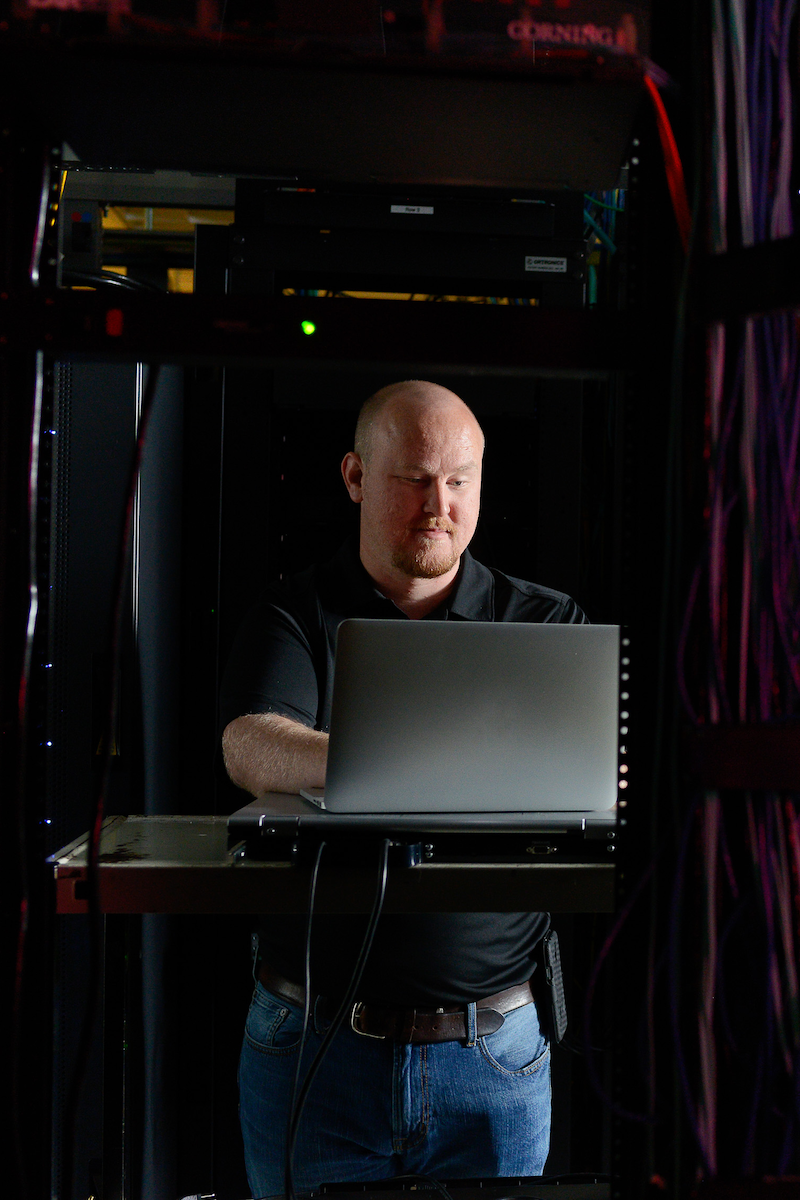
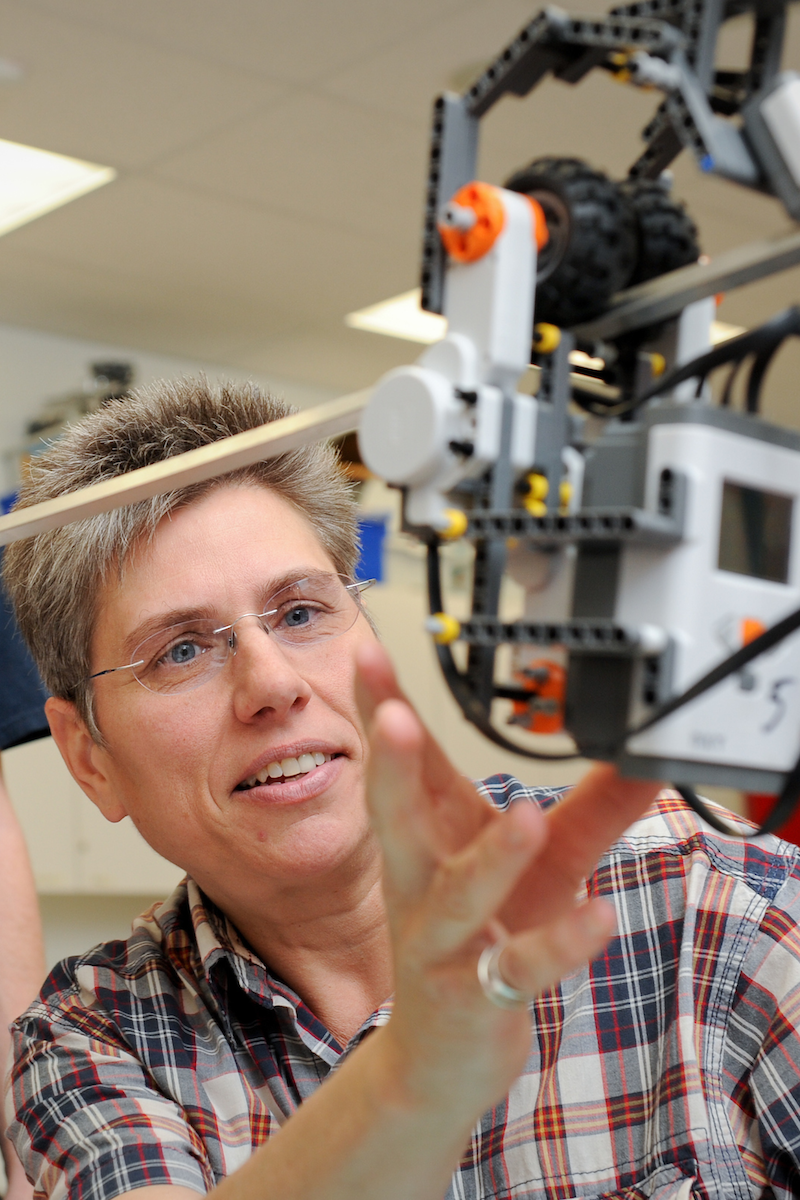
GOAL 3: ENHANCE INTERDISCIPLINARY SCHOLARSHIP TO ADDRESS THE GRAND CHALLENGES OF SOCIETY
- Completed with Research and Innovation the development of a Secure University Research Environment (SURE) to support sensitive research contracts or grants that require NIST 800-171 compliance and the Department of Defense FAR Supplement (DFARS) clause.
- Working with the College of Agriculture and Life Sciences (CALS) to develop big data strategy and initiatives to support the Plant Sciences Initiative.
- Participated as a principal investigator with RTI International and CALS on a National Science Foundation / Sloan Foundation grant to sponsor a workshop to leverage Agricultural Extension to teach data science in rural areas for economic development.
- Partnered with Research and Innovation to form teams for cyber grants.
- Expanded cloud services support, including architecture and implementation services for researchers.
GOAL 4: ENHANCE ORGANIZATIONAL EXCELLENCE BY CREATING A CULTURE OF CONSTANT IMPROVEMENT
- Enrolled approximately 24,000 employees, including faculty, staff, student employees, no-pay employees, and retirees, in the university’s two-factor authentication solutions — Google 2-Step Verification and Duo Security — to protect university and personal data against ongoing cyber threats.
- Upgraded network wiring infrastructure in nine buildings, including three residence halls.
- Installed resilient fiber path connecting the Centennial Biomedical Campus (College of Veterinary Medicine campus) with main campus ahead of I-440 beltline widening.
- Chose the North Carolina Department of Information Technology data center to replace campus’ aging Data Center 1. Movement of equipment has begun.
- Released the IT Governance redesign to clarify the role of IT governance and differentiate it from operational and advisory roles.
- Launched, in partnership with Verizon, the first phase of SpiderCloud to enhance campus cell phone coverage.
- Created a process for blocking numbers reported as being spam or vishing attacks.
- Rolled out Google Team Drives to campus, improving file ownership options for university data resources.
- Implemented enhancements in the Financial System to MarketPlace to streamline procurement for campus. Developed pivot grids and work centers to streamline processing for Accounts Payable and migrated Service Centers to more efficient billing processes.
- Migrated the 20-year-old homegrown Leave System to the Absence Management module to integrate absence and payroll processing, eliminate duplicate data entry and provide more timely absence-based payroll processing in the HR System. Implemented time punching for all Fair Labor Standards Act (FLSA)-subject employees to increase compliance support.
- Upgraded the MyPack Portal, the Financial System and HR System homepages, the Employee Self Service and the Student Information System to a more modern, mobile-friendly Fluid user interface.
- Onboarded several units, including the Division of Academic and Student Affairs (DASA), the Office of Research, Innovation and Economic Development (ORIED), Human Resources, and Enrollment Management and Services, into the REPORTER non-credit system. OIT now has 30 departments and units onboarded, managing 115,000 registrations for 4,050 classes involving $3.2 million in fees.
- Participated in and helped coordinate information requests for multiple audits:
- Conducted by NC State Internal Audit Division, the Audit of User Controls Over Ultra-Sensitive Data reviewed how users were protecting this data and if they were following university procedures,
- Conducted by the Office of the State Audit, the IT General Controls Audit evaluated NC State’s entity-wide information systems controls.
- Conducted by external entity BDO LLP, the Foundations IT Audit evaluated the IT controls of various foundations and LLCs associated with the university (except Textile Foundation and Wolfpack Club).
- Conducted by the Office of State Audit, the IT Controls section of the annual Financial Statement Audit evaluated the specific information systems controls that directly impact the university’s financial statement.
- Implemented ShareBase to provide secure file upload capability in response to customer needs and data security concerns highlighted in the sensitive data audit.
- Began the move of all Oracle enterprise databases to Oracle’s Exadata composite database server platform to improve performance and provide enhanced fault tolerance and disaster recovery capabilities.
- Implemented the SAS Visual Analytics platform for the Graduate School and the Office of Institutional Research and Planning to improve business intelligence capabilities.
- Exceeded 40,000 downloads and activations for the more popular software applications.
- Reviewed 145 additional clickwrap agreements for risks (up from 105 last year). A total of 851 have been reviewed since inception.
- Continued to enhance the IT Purchase Compliance Review process to review software purchases over $5,000 for security and accessibility compliance. In the past year, 191 reviews (an increase from last year’s 83 reviews) were conducted.
- Developed an online database to manage all software licensing, contracts and procurement.
- Deployed Spirion for Sensitive Information Identification and Remediation (SIIR) to all NC State managed workstations for Payment Card Industry Data Security Standard (PCI DSS) validation and to identify and remove sensitive data that reside on workstations.
- Attested compliant PCI DSS, with the Controller’s Office, for three of the four merchant types in March 2018. The remaining merchant type, Self-Assessment Questionnaire (SAQ), is expected to be 100 percent compliant in August 2018.
- Contracted an external vendor to conduct a full security assessment and privacy review of the university’s compliance with HIPAA (Health Insurance Portability and Accountability Act of 1996).
- Enhanced the OIT Portfolio tool to track/manage Portfolio projects and OIT Cybersecurity Roadmap Projects.
- Received 993 new applications for InCommon Certs compared to 291 last year. As a result, maintained public website keys that require secure transfer and maintained successful operations of programs and applications that require secure communications. This adds up to a total of over 2,250 active certificates.
- Issued the first User Certificate to campus to identify a user, machine or device before granting access to a resource, network or an application.
- Assisted over 1,300 people to avoid further compromise with improvement of detection and response systems. This is a decrease of more than 400 from last year.
- Processed over 12,230 ServiceNow tickets in support of Security Services including scanning, Tripwire, and Splunk — a dramatic increase from 1,080 last year.
- Sponsored the 2017 CyberSecurity Awareness Month (CSAM), “Protect the Pack:Turn on 2FA.” OIT offered a number of 2FA days to assist campus users with their enrollment in Google 2-Step and Duo Security.. Cheri Caddy of the National Security Agency (NSA) delivered the keynote address, “Cyber Security: The Ultimate Joint Mission..
- Hosted the 2018 Data Privacy Month (DPM), “Protect the Pack! Protect your Selfie!” to empower users with tools and the knowledge necessary to protect their privacy and control their digital footprint. The campaign reached many groups throughout campus with three presentations and SANS Securing the Human videos covering various security topics.
- Updated and enhanced University Data Sensitivity Framework (DSF) training to increase campus awareness of data classification, threats to digital assets, and methods for defending against threats. Approximately 500 employees have completed the training and many groups have requested targeted data-security training.
- Assisted with the development and implementation of data-security training designed for researchers working with sensitive data that require additional protection by statutory or contractual obligation.
- Published Cybersecurity Incident Response Procedure and Endpoint Protection Standard, continuing ongoing efforts to enhance campus data security.
- Facilitated development of mandatory Basic Security Awareness Training, providing a mechanism to increase successful outreach while collecting metrics to support data-security and protection efforts.
- Rolled out a test environment and provided extensive training and development for campus web developers in anticipation of transition to the new Gutenberg editor within WordPress environment. Also shared this information with broader WordPress community.
- Released PackTV and NC State TV channels for Apple TV and Roku services.
- Resolved 2,519 Managed Desktop Support service and support incidents this year.
- Completed Phase 3 of the Windows 10 migration, migrating over 1921 out of a total of 3,188 machines.
- Started the migration of the department of Marine Earth and Atmospheric Sciences to the OIT Managed Desktop environment.
- Completed the transition from analog to digital audio/visual systems in all classrooms.
- Closed two student computing spaces in 2017-18. The Stinson Collaborative Commons, aka the “Laundry Lab,” and the University College Commons lab closed in May 2017 to provide space for other university units or services.
- Upgraded ServiceNow to Jakarta, providing increased functionality. Developed several applications, including Data Center Intake, IT Purchase Compliance, DELTA Knowledgebase migration, and the Get2Factor tool for Google 2-Step verification.
- Provided audio-visual integration services for a number of campus projects, saving ~$75,000 in integration costs.
- Completed several IT Service Management projects, including Service Catalog Readiness Assessment, a Service Definition Workshop, and Incident and Knowledge Management Process Optimization. These projects are part of OIT’s work to develop an IT service portfolio and develop and automate key IT Service Management processes such as configuration management, asset management, change management and service catalog management.
- Completed in partnership with Research and Innovation the development of a Secure University Research Environment (SURE) to support sensitive research contracts or grants that require compliance with NIST 800-171 and the Department of Defense FAR Supplement (DFARS) clause.
- Provided development of multiple WordPress plugins for campus use, including the Accessibility Helper, Content Auditor and NC State Shortcodes.
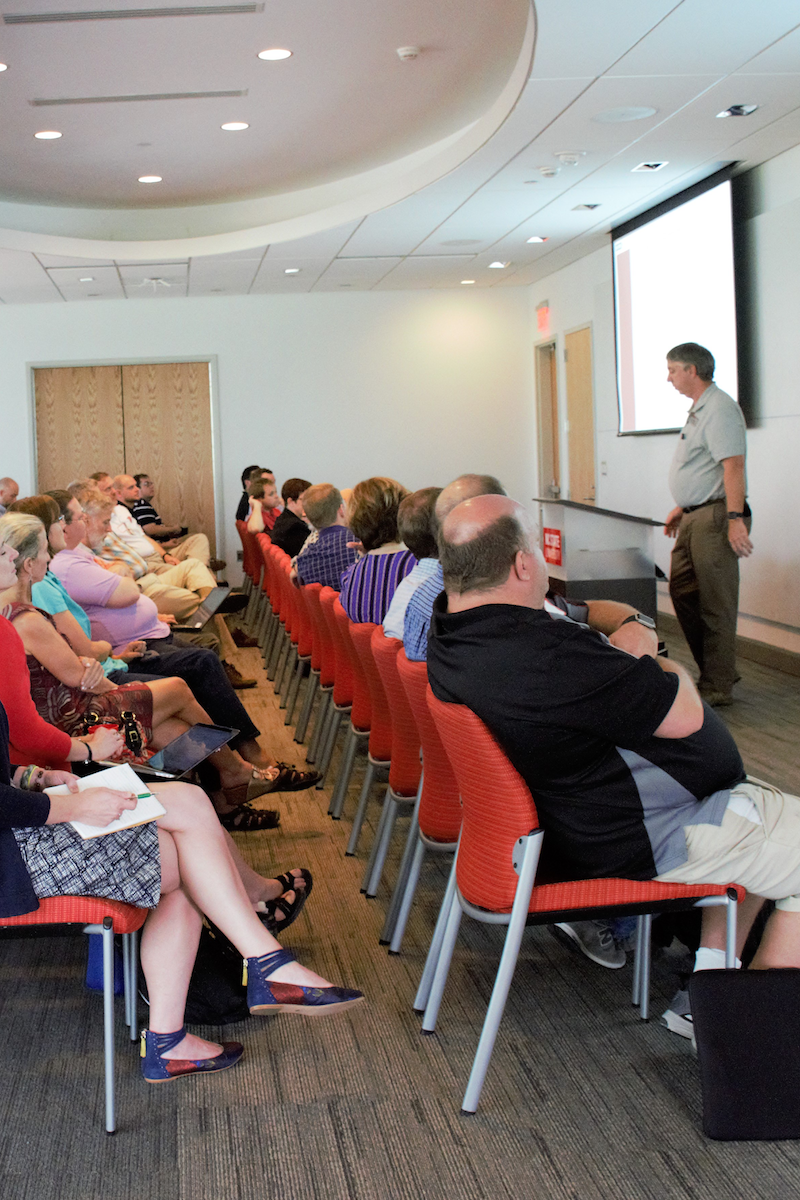

GOAL 5: ENHANCE LOCAL AND GLOBAL ENGAGEMENT THROUGH FOCUSED STRATEGIC PARTNERSHIPS
- Added North Carolina A&T and University of North Carolina-Pembroke to the list of UNC schools for whom we provide telephony support. These partnerships allow these universities to provide phone service at a much lower rate while providing NC State with additional staff resources to improve resiliency of skill sets.
- Continue to serve as a member of various security organizations to share current security threats and resources. Current memberships include: the Multi-State Information Sharing & Analysis Center, the Research Education Network Information Sharing & Analysis Center, the ISACA, the FBI’s InfraGard, the Information Systems Security Association, the International Information System Security Certification Consortium (ISC)2, the Project Management Institute, and the FBI Red Dart/NCMS.
- Presented (ISC)2 Safe & Secure Online curriculum to more than 300 elementary and middle school students and parents.
- Developed and shared with the NC State and higher education WordPress community an Accessibility Helper plugin that scans pages for accessibility barriers prior to publishing and provides feedback to help fix them.
- Continue to work with North Carolina Department of Information Technology on shared data center services.
- Supported multiple regional fiber initiatives:
- Worked with MCNC and RTP on a new fiber pathway project.
- Supported the efforts of WestNGN Broadband to bring fiber to the region.
- Helped Norfolk and Virginia Beach develop a fiber plan.
Staff Achievement
More than 2,000 employees attended NC State’s Staff & Faculty Appreciation Day on Dec. 12. OIT staffed a booth and gave away 2FA notebooks and stickers. Employees could also register to win a U2F security key.
From the completion of the network infrastructure upgrade (l-r) to volunteering at the Food Bank of Central and Eastern North Carolina to participating in NC State’s WolfPack Way of Life Wellness Fair, OIT does what it takes to support our campus and surrounding communities.
Major Appointments
- Damon Armour was hired as the director of Information Security Risk and Assurance (ISRA) in Security and Compliance.
- Kristina Kelly was named associate director for Operations in Communication Technologies.
OIT Division Award for Excellence
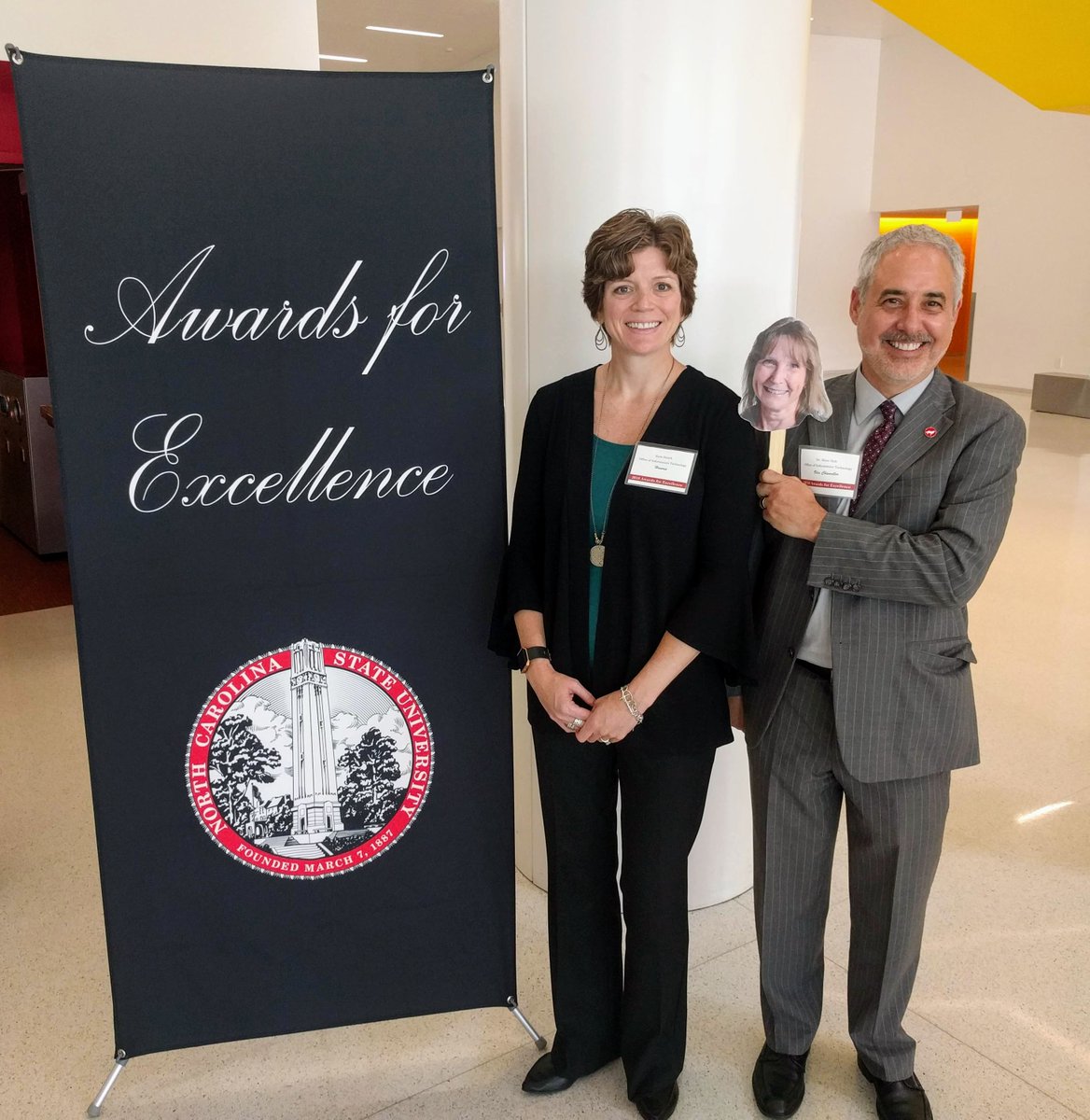
The 2018 OIT Division Award for Excellence winners were Sarah Noell of Outreach, Communications and Consulting and Kate Smith of Enterprise Application Services. Both were recognized for their “meritorious accomplishments and contributions.”
Natalie Boone, Nik Davlantis, Dan Evans, Darren Fallis, Josh Jury, Andrew Kotynski, Jason Maners, Katie McInerny, Lavanya Sridharan, Lamiyne Vaughn, and Angela Walker were also nominated for this award.
Equity for Women Award
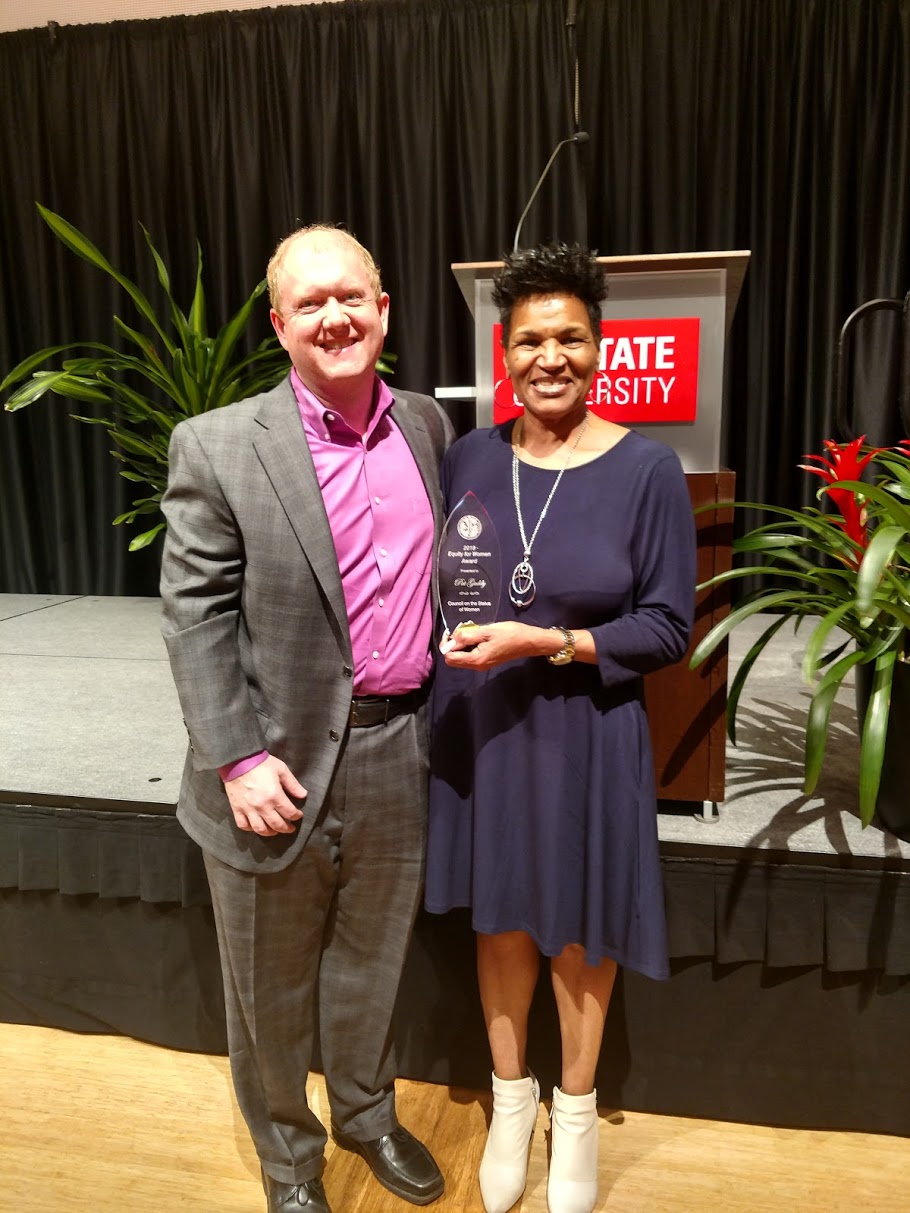
Pat Gaddy of ComTech won the 2018 Equity for Women Award. Sponsored by the Council on the Status of Women, the award recognizes a student, faculty and staff member for their outstanding leadership in establishing equity for women at NC State University.
Gaddy was presented the Staff Award at the annual Sisterhood Dinner on Feb. 26.
Pride of the WolfPack Award
2017-2018 Pride of the WolfPack Award winners were Dan Evans, Louise Flinn, Blake Kannarr, Katie McInerney, Lavanya Sridharan, and Lamiyne Vaughn. The Award honors staff members who make significant contributions to improving the services, systems and experiences of OIT, as well as the campus community.
T.O.A.S.T. Award
If you’ve received a T.O.A.S.T. Award this year, you’ve exhibited Totally Outstanding Attitude, Service and Talent. The 2017-2018 award recipients are: Peyton Armstrong, Madeline Bagby (2), Ethan Barry, Rennie Bidgood, Deborah Booth, Mary Celine Braza (2), Jenna Brown (2), Antoine Carlet (2), Matthew Castle, Cameron Chauvaux, Sean Cherlinczuk-French, Bryce Clodfelter, Elizabeth Cole-Walker, Bobby Coleman, Sarah Couch, Joshua Crowell, Caffie Darden (2), Nik Davlantis, Darian Deanhardt, Spencer Dearmin, Chris Deaton (3), Brian DeConinck (3), Matt Domnick, Mike Donathan, Chris Eaves (2), Miles Elliot (2), Lauren Etheridge, Tom Farwig, Kevin Ficker, Louise Flinn (4), Brian Fontaine, Mia Freeland, Alvin Gilmore, James Glover, Rhonda Greene (4), Jonathan Greene (2), Gail Gregory, Mark Harben (2), Matthew Haught, Cameron Hetzler, Karen Horne, Leo Howell, Will Jackson, Tarasa Jackson, Nipunya Khullar, Taylor Lundy, Neal McCorkle, Beau McElreath, Jen McFarland, Nicole Navaroli, Kassidy Newell, Josiah Nicholson, Megan O’Connor, Katherine O’Malley, Jacob Parsons (2), Karina Patel, Leigh Peel, Quentin Periffer, Allan Petit-Frere, Jill Phipps, Shivanjali Pothan, Lahari Revuri, Nicole Rivera, Katrina Robeck, Don Schmidt, Logan Sims, Logan Skeehan, Robert Spencer, Crystal Tenan (2), Crystal Thao, Dave Van Emden, Lamiyne Vaughn, Charles Walker (2), Elizabeth Warner, Don Waterman, Brennan Watson, Chris Webster, and Zachary Zientek.
Service Awards
This fiscal year, NC State recognized 57 OIT employees who reached five-year milestones in their university service. They are:
5 Years of Service
- Dan Boemermann
- Brian Boley
- Saritha Bollapalli
- Shawn Caton
- Kerry Digou
- Brett Horton
- Jill Phipps
- Eric Poirier
- Joshua Snapp
- Cody Sutler
- Elizabeth Warner
10 Years of Service
- Robert Blanke
- Ron Bradley
- Mary Kay Cahoon
- Danny Davis
- Matthew Domnick
- Alvin Gilmore
- Troy Holder
- Mounika Jala
- Derek Jordan
- Taylor Lundy
- Stephen Neal
- Kenneth Rich
- Don Schmidt
- David Van Emden
- Shawn Van Hulst
- Charles Walker
15 Years of Service
- Adam Andruchowitz
- Therese Burkhart
- Delecia Council
- Michael Frechette
- John Foster
- Randall Greenly
- Lee Hargis
- Ollin Hunt
- Brian Judson
- Neal McCorkle
- Jason Myatt
- Connie Reitfort
- Samson Teshome
20 Years of Service
- Rhonda Batts
- Rolf Grandstaff
- Karen Horne
- Tom Karches
- Eugene Morse
- Katherine O’Malley
- Lee Pipkin
25 Years of Service
- James Beatty
- Bruce Kluckman
- David Ladrie
- Stan North Martin
- Ed Rogers
- Jim Xie
30 Years of Service
- Sherwood Bryan
- Sarah Noell
35 Years of Service
- Tom Holden
- Harry Nicholos
40 Years of Service
- Peggy Watkins
Retired
OIT employees who retired during the 2017-2018 fiscal year include: Alan Galloway, Febbie C. Gordon, Ollin Hunt, Janet Martin, Katherine F. Mauney, Katherine D. Mebane, George Mitchell Nipper III, Robert Louis Pilot, and Jianmin Xie.
Professional Activities
- Damon Armour, Mardecia Bell, Deborah Booth, and Elizabeth Cole-Walker are members of ISACA.
- Damon Armour, Mardecia Bell, Deborah Booth, and Andy Kotynski are members of the Information Systems Security Association (ISSA), along with Elizabeth Cole-Walker who also supports the ISSA career services board and Infosecon as a volunteer.
- Damon Armour, Deborah Booth, Andy Kotynski, and Andy Raynor are members of the International Information System Security Certification Consortium (ISC2).
- BJ Attarian received his certification as a Final Cut Pro X instructor.
- BJ Attarian and Brandon Bouché, along with Hal Meeks, host the Bars and Tone podcast on behalf of the Association for Higher Education Communications Technology Advancement.
- Everette Allen co-leads the UNC CAUSE Apple Managers SIG and co-facilitated the summer meeting at Appalachian State University. He continues to represent NC State and OIT on the Apex High Academy of Information Technology.
- Mardecia Bell served as chair of the IT Governance Security and Compliance Subcommittee (SCGS) and served on the UNC System Office IT Security Working Group, which was created to address information security weaknesses across all campuses. She also serves as a member of the UNC Information Security Council.
- Mardecia Bell, Elizabeth Cole-Walker and Andy Kotynski are members of the FBI’s InfraGard.
- Deborah Booth served as the HIPAA Security Officer and program and event coordinator for the 2017 Cybersecurity Awareness month campaign. She is a member of the HIPAA Compliance Sub Working Group, which is tasked with enhancing NCSU HIPAA compliance.
- Ron Bradley, David Ladrie and Elizabeth Warner organized the 2017 Classroom Summit, which brought attendees from across the state to NC State’s campus. Damian Boyce, Antoine Carlet, Will Jackson, and Brennan Watson were key support staff. ClassTech staff were also involved in the 2018 Classroom Summit, hosted in May in Asheville, NC.
- Brandon Bouché received his certification in Final Cut Pro X and DaVinci Resolve video editing software.
- Therese Burkhart, Yessy Mendoza-Tate and Cody Sutler presented at this year’s Oracle Alliance Conference (the PeopleSoft User Group conference) on custom functionality developed in the Financial System.
- Ron Bradley, Danny Davis, Nik Davlantis, David Ladrie, and Susan West received their ITIL Service Transition certifications.
- Bill Coker served as chair of the Client, Application and Support Software Working Group.
- Elizabeth Cole-Walker participated in the FBI Red Dart sponsored by the Carolina Chapter of the Society of Industrial Security Professionals. She also was invited to be a guest lecturer for an ECU IT Security Policy undergraduate class.
- Sarah Couch completed the Equal Opportunity Institute year-long certificate program.
- Danny Davis earned his Certified Public Manager Certification in October 2017.
- Brian DeConinck and Crystal Tenan presented at WPCampus Online and WordCamp Raleigh 2018 conferences.
- Brian DeConinck presented at the WPCampus 2017, WordCampUS 2017 and WordCamp Boston 2017. He also hosts and produces the monthly WPCampus podcast.
- Kerry Digou was recertified as an Internal Security Assessor for Payment Card Industry Data Security Standard.
- Miles Elliott and Lauren Etheridge presented at WordCamp Raleigh 2018.
- Darren Fallis serves as the OIT representative to the University Institutional Review Board, which is charged to protect human subjects participating in research across the university. Elizabeth Cole-Walker serves as OIT’s alternate representative.
- Jack Foster presented at the University Professional and Continuing Education Association conference on custom functionality developed in REPORTER.
- Rhonda Greene serves as a member of the Public Relations Society of America Technology Section’s Executive Committee and co-chairs its Sponsorship and Fundraising Committee. She also serves on the Staff Senate as an alternate member.
- Andy Kotynski served as chair of the SCGS Security Technology Working Group. He also presented ISC2 Safe & Secure Online curriculum to over 300 elementary and middle school students and parents.
- Andy Kotynski and Lavanya Sridharan are members of the Project Management Institute.
- Tim Lowman presented at the 2018 Southeast Google Meetup.
- Jason Maners serves as the coordinator for UNC CAUSE Special Interest Groups.
- Stan North Martin serves as co-chair of the EDUCAUSE IT Communications Constituent Group.
- Jen McFarland co-chaired the 2017 UNC CAUSE conference and helped to coordinate and presented at WordCamp Raleigh 2018.
- Jason Myatt and Elizabeth Warner help coordinate the NC Project Management Institute Higher Education Community of Practice.
- Harry Nicholos served on the planning committee and co-chaired the vendor committee for the 2017 UNC CAUSE conference.
- Sarah Noell serves as president of UNC CAUSE.
- Gabe Simerson earned his ServiceNow Certified System Administrator certification.
- Crystal Tenan presented at the Student Government Town Hall on Accessibility.
- Elizabeth Warner earned her Project Management Professional Certification.
- Several OIT staff presented at the UNC CAUSE annual conference in November 2017.
- Participated in Campus Service Desk Managers Birds of a Feather quarterly meetings, discussing common challenges, issues, tools, and approaches building consistency and excellence in the support offered to the campus community. These meetings are a collaborative effort among campus service desk managers.
Staff Diversity
With a workforce of 204 men and 87 women ranging in age from their 20s to 80s, our staff brings unique value and perspective that can only yield innovative technology.
We continue to reach out to underrepresented populations to increase diversity in our work environment. See related charts regarding our workforce culture:
| IT Staff | FY 2017-18 | FY 2016-17 |
|---|---|---|
| African American | 34 | 36 |
| American Indian | 4 | 3 |
| Asian | 24 | 25 |
| Hispanic | 8 | 8 |
| White | 221 | 220 |
| Total | 291 | 292 |
| OIT Staff Age Group | Number of Employees | Percentage of Workforce |
|---|---|---|
| 20s | 16 | 5.5% |
| 30s | 56 | 19.2% |
| 40s | 100 | 34.4% |
| 50s | 91 | 31.3% |
| 60s | 24 | 8.3% |
| 70s | 3 | 1.0% |
| 80s | 1 | 0.3% |
Contributors: Making SURE by Rennie Bidgood; Portal to student success by Karina Patel; Scoring a hat trick by Mia Freeland and Suzanne Wardle; and The right step by Rhonda Greene.

